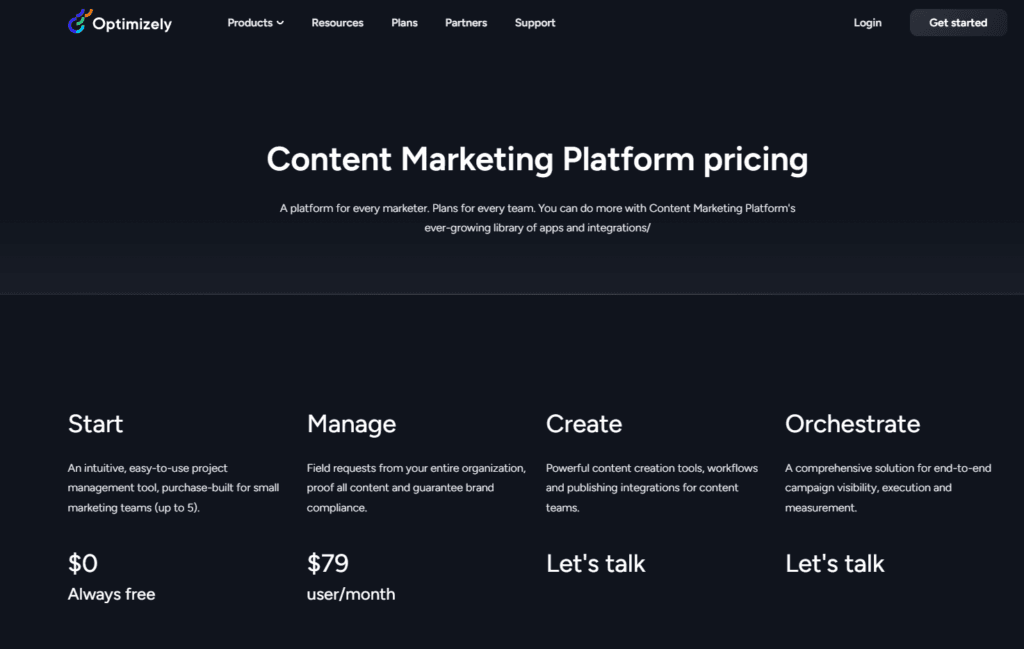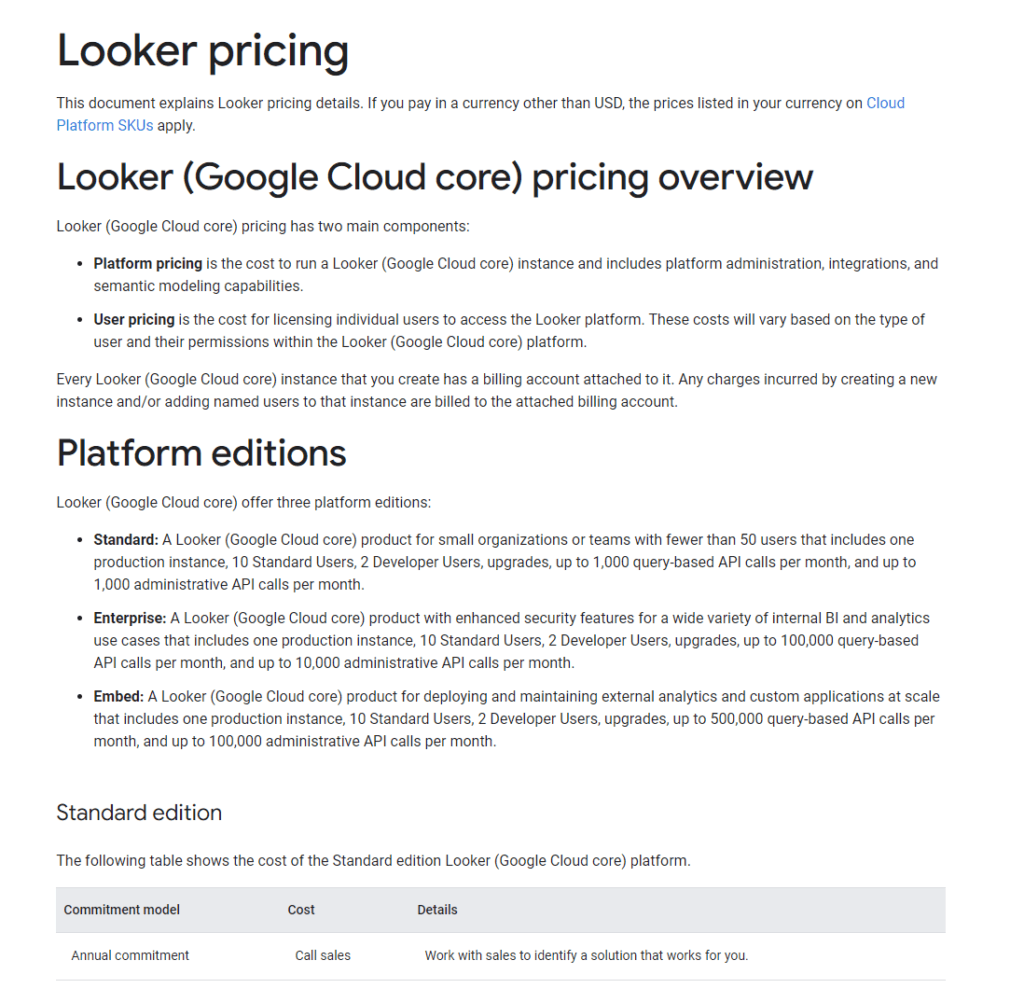In the bustling marketplace of CRM tools, where every platform promises the moon, navigating to the one that aligns with your business’s orbit can feel like steering a spacecraft in zero gravity. Among the stars, two constellations shine brightly, guiding digital marketers and data analysts in their quest for growth and insight: Optimizely and Looker. While both tools orbit the digital universe, they do so with different missions. Optimizely, with its focus on experimentation and optimization, offers a telescope to view the impact of changes directly on user experience and conversion rates. Looker, on the other hand, acts more like a satellite, providing a broader view of data across all business operations for in-depth analysis and reporting. Let’s embark on a journey to explore one vital aspect where these tools show their true colors: Data Analysis and Reporting.
| Optimizely | Looker |
|---|---|
 | |
| G2 Score -4.3 out of 5 | G2 Score -4.4 out of 5 |
| TrustRadius Score -8.6 out of 10 | TrustRadius Score -8.0 out of 10 |
Data Analysis and Reporting: The Lens Through Which We View the Digital Cosmos
In the vastness of digital space, data is the north star that guides decision-making. How a tool allows you to analyze and report on this data can significantly impact your marketing strategy and business growth.
Optimizely: Experimentation at the Speed of Light
Optimizely shines in the universe of A/B testing and experimentation, providing marketers and product teams with the tools to hypothesize, test, and iterate at warp speed. Its platform is designed with the precision of a laser, focusing on how changes to your digital properties affect user behavior and business outcomes. Optimizely’s strength lies in its ability to provide real-time data on experiments, whether it’s tweaking a call-to-action, adjusting layout designs, or testing new features.
The platform’s reporting capabilities are robust, offering clear, actionable insights into which variations perform best and why. This level of detail not only aids in optimizing user experiences but also empowers teams to make data-backed decisions quickly, reducing the guesswork that often accompanies digital innovation.
Looker: Navigating the Data Universe
Looker, with its powerful data analytics platform, offers a comprehensive view of your business’s data landscape. It’s like having a map of the cosmos, where every star and planet represents a piece of data from different aspects of your business operations. Looker excels in aggregating this data, allowing for deep dives into analysis that can uncover trends, patterns, and insights across customer interactions, sales performance, and operational efficiencies.
Its strength is in the customization of dashboards and reports, enabling users to tailor their data view to meet their specific needs. Looker’s approach to data analysis is democratic, empowering everyone within an organization to access, understand, and act on data insights. This broad accessibility is key to fostering a data-driven culture, where informed decisions are made at every level.
Pricing and Value: The Economic Orbit of Digital Tools
In the universe of business operations, the economic impact of adopting a new tool is a critical consideration. It’s not just about the sticker price; it’s about the return on investment, the scalability of pricing as your business grows, and the alignment of the tool’s capabilities with your strategic objectives. Let’s examine how Optimizely and Looker navigate these economic orbits.
Optimizely: Tailored Experiments

Optimizely’s approach to pricing is as customized as its experimentation capabilities. Rather than offering a one-size-fits-all pricing structure, Optimizely works with businesses to develop a pricing plan that matches their specific needs and scale. This tailored approach ensures that companies pay for the level of experimentation and optimization they require, without unnecessary extras inflating the cost.
While this customized pricing model can provide significant value by closely aligning the tool’s offerings with a business’s needs, it also means that potential users must engage with Optimizely’s sales team to get a clear understanding of the costs involved. For businesses heavily reliant on A/B testing and personalization, the investment in Optimizely can yield considerable returns in improved user experience, conversion rates, and ultimately, revenue.
Looker: Comprehensive Analytics

Looker, now part of Google Cloud, structures its pricing around packages that reflect the scale of a business’s data needs and the sophistication of the analytics required. The platform is known for its comprehensive data exploration capabilities, and its pricing model is designed to reflect the value of in-depth data analysis across all facets of a business.
Businesses interested in Looker must consider not just the cost of the software itself but also the broader investment in creating a data-driven culture. Looker’s ability to democratize data access and empower decision-makers across an organization can transform business operations, making data a central pillar of strategy development and execution.
User Interface and User Experience: Piloting Through the Digital Cosmos
A tool’s UI and UX are like the cockpit of a spacecraft; they determine how easily you can pilot your marketing strategies and analyze your voyage through the digital universe. An intuitive, well-designed interface can make navigating through data and campaigns feel like gliding through starfields, while a clunky, confusing layout can feel like getting caught in a gravitational pull.
Optimizely: The Intuitive Craft
Optimizely, with its focus on experimentation and optimization, presents users with a cockpit that’s both sophisticated and user-friendly. The platform is designed to make complex processes, such as creating and managing experiments, as straightforward as possible. This is achieved through a clean, intuitive interface that guides users through each step of the process, from setting up tests to analyzing results.
The dashboard is a control center that gives an at-a-glance overview of ongoing experiments, performance metrics, and actionable insights. Optimizely’s commitment to a frictionless user experience is evident in its layout and navigation, which are crafted to ensure that even those new to A/B testing can become adept pilots quickly. This ease of use doesn’t come at the expense of depth; advanced users will find powerful tools and detailed analytics at their fingertips, ready to launch sophisticated missions into the depths of data analysis.
Looker: The Commanding Observatory
Looker takes a slightly different approach, focusing on providing a comprehensive view of your business’s data landscape. Its platform acts more like a commanding observatory than a simple craft, offering deep insights into every corner of your digital universe. Looker’s interface is designed to accommodate the complexity and richness of the data it handles, offering customizable dashboards and detailed reports that can be tailored to specific needs.
While Looker’s cockpit might seem more complex at first glance, especially to those new to data analytics, it’s built with the intention of making in-depth analysis accessible and actionable. Tools like LookML, Looker’s modeling language, allow for the customization of data analysis, making it possible to explore vast data sets with precision. The platform also focuses on collaboration and sharing, making it easier for teams to work together in this observatory, analyzing data, sharing insights, and making decisions based on comprehensive reports.

Related: Check out our free SEO suite

The Community and Ecosystem: Expanding the Universe of Possibilities
In the voyage through digital space, a supportive community and a versatile ecosystem serve as the galaxy clusters that connect various stars and planets, creating a universe brimming with possibilities for exploration and discovery.
Optimizely: The Experimenters’ Alliance
Optimizely’s universe is populated by a community of forward-thinking experimenters and optimizers. This alliance is strengthened by an ecosystem that includes a variety of third-party integrations, plugins, and extensions designed to enhance experimentation capabilities. Optimizely’s Xchange, a marketplace for extensions, enables users to find and utilize additional tools that complement their experimentation strategies, from analytics enhancements to personalization widgets.
The community itself is a thriving hub of knowledge sharing, with forums, online meetups, and dedicated events like Opticon, where users, partners, and industry leaders come together to share insights, strategies, and success stories. This vibrant community not only provides a support network for solving technical challenges but also serves as an innovation incubator, where new ideas and approaches are constantly explored and developed.
Looker: The Data Explorers’ Guild
In Looker’s corner of the universe, the ecosystem extends through its powerful API and the multitude of data applications built around it, facilitating deep, custom analytics solutions. The platform’s Block Directory offers ready-to-use blocks that simplify complex analyses and integrations, enabling users to quickly implement advanced data models and visualizations.
The Looker community, meanwhile, forms a guild of data explorers — a mix of data analysts, business intelligence professionals, and decision-makers — all united in their quest for deeper insights. Supported by Google Cloud, this community enjoys access to a broad range of forums, user groups, and educational resources, including Looker’s own events and conferences that foster learning, networking, and innovation. This ecosystem not only amplifies Looker’s analytics capabilities but also encourages a culture of data literacy and shared wisdom that benefits all members.
Future Outlook and Development Trajectory: Charting the Course Ahead
In the vastness of space, a navigator’s ability to anticipate and adapt to oncoming cosmic winds and gravitational shifts is paramount. Similarly, in the digital marketing universe, a platform’s commitment to innovation and its vision for the future can significantly influence its ability to help businesses thrive amidst changing conditions.
Optimizely: The Horizon of Experimentation
Optimizely, having established itself as a leader in the field of experimentation, continues to push the boundaries of what’s possible in optimizing digital experiences. Its commitment to innovation is evident in its regular platform updates and feature releases, designed to enhance the capabilities of marketers and developers in creating personalized, impactful user experiences.
Looking ahead, Optimizely’s trajectory is set on expanding its machine learning and artificial intelligence capabilities to automate and refine the experimentation process further. This includes more predictive analytics features, enabling businesses to anticipate user behaviors and preferences with greater accuracy, thereby crafting more targeted and effective experiments. Optimizely’s future looks like one where experimentation becomes an even more integrated part of the digital strategy, powered by insights drawn from increasingly sophisticated data analysis tools.
Looker: The Expanding Universe of Data
Looker, under the Google Cloud umbrella, is strategically positioned to leverage the vast technological resources and cloud infrastructure of its parent company. This relationship is key to Looker’s development trajectory, focusing on deepening its data analytics and business intelligence capabilities, particularly through advancements in cloud computing, big data, and machine learning technologies.
The future outlook for Looker involves enhancing its already robust data exploration and reporting tools, making them more intuitive and accessible to users across organizations. Looker aims to democratize data further, breaking down silos and making it easier for every team member, regardless of their technical expertise, to make data-driven decisions. Integration with Google Cloud’s AI and machine learning services is also on the horizon, promising to bring even more powerful analytics capabilities to Looker users, enabling them to uncover insights and trends that were previously beyond reach.
Conclusion
As we conclude our interstellar journey through the digital marketing cosmos, comparing the trajectories and capabilities of Optimizely and Looker, it’s evident that both platforms offer unique strengths and visions for the future. Optimizely, with its focus on experimentation and personalization, and Looker, with its deep data analytics and business intelligence, represent two leading lights in the universe of digital marketing tools, each guiding businesses toward understanding and engaging their audiences more effectively.
READ NEXT:
- SugarCRM vs Vtiger: The Best CRM Tool for You
- HubSpot Marketing Analytics vs Heap: The Best Analytics Tool for You
- Delivra vs MailUp: The Best Email Marketing Tool for You
- Delivra vs EmailOctopus: The Best Email Marketing Tool for You
- 11 Marketing Analytics Tools to Elevate Your Data-Driven Strategies
- 29+ Digital Analytics Software to Skyrocket Your Digital ROI
- MicroStrategy vs Heap: The Best Analytics Tool for You






















Comments are closed.